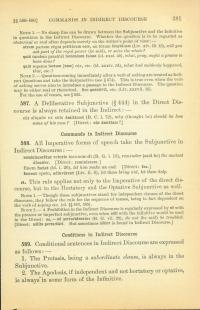588. All Imperative forms of speech take the Subjunctive in Indirect Discourse.
reminīscerētur veteris incommodī (B. G. 1.13) (He said) remember the ancient disaster. [Direct: reminīscere]
fīnem faciat (id. 1.20) let him make an end. [Direct: fac]
ferrent opem, adiuvārent (Liv. 2.6) let them bring aid, let them help.
a. This rule applies not only to the Imperative of the direct discourse, but to the Hortatory and the Optative Subjunctive as well.
Note 1— Though these subjunctives stand for independent clauses of the direct discourse, they follow the rule for the sequence of tenses, being in fact dependent on the verb of saying etc. (cf. § 483, § 585).
Note 2— A Prohibition in the Indirect Discourse is regularly expressed by nē with the Present or Imperfect Subjunctive, even when nōlī with the infinitive would be used in the Direct.
nē perturbārentur. (B. G. 7.29), (He said) do not be troubled. [Direct: nōlīte perturbārī. But sometimes nōllet is found in Indirect Discourse.]

